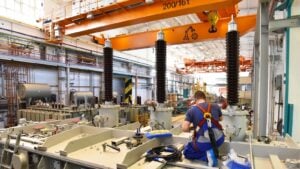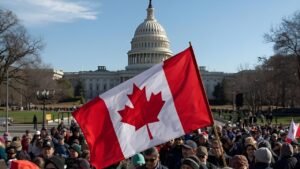Stellantis plans to move production of a Jeep model to the United States, putting about 3,000 jobs in Brampton, Ontario at risk and pushes a community that has built vehicles for decades.
The decision immediately escalated into a political and economic flashpoint, with Canada’s industry minister warning the company to honor commitments tied to substantial government support.
In a letter dated Oct. 15, 2025, Minister Mélanie Joly told Stellantis CEO Antonio Filosa that shifting the Compass mandate would be “unacceptable,” and said the government would “exercise all options, including legal,” if the automaker fails to meet its obligations in Canada.
Joly acknowledged the “complex challenges” created by the current U.S. tariff environment but said Ottawa expects the company to respect job and investment commitments made in exchange for financial support and market access.
She also urged Stellantis to extend a worker transition program, agreed with Unifor, through at least 2027, and to present a plan to secure the long-term future of its Ontario operations.
The company has not publicly detailed the timeline or the receiving U.S. plant for the Jeep work.
A move of the Compass mandate would squeeze Brampton and its unionized workforce, while reordering a North American production footprint that was already in flux as automakers retool for electric vehicles and adapt to shifting trade priorities.
The letter cites “millions of vehicles” produced in Brampton and Windsor over time and notes Canada remains a significant market for Stellantis, with more than 150,000 vehicles sold annually.
Public reaction was immediate and polarized as Conservative MP Raquel Dancho criticized Ottawa’s approach to auto subsidies, writing that Stellantis received “up to $15 billion in taxpayer subsidies” without guarantees to retain jobs in Canada.
She called to reconvene the Industry Committee to examine how the outcome occurred and to provide clarity for workers.
Her comments speak to a bigger debate over whether public money has effectively anchored private investment at a time of global competition for EV and battery plants.
Others framed the move as a broader indictment of industrial policy. “Stellantis CEASES Jeep Compass production in Brampton and is set to relocate their operations to Illinois,” one commentator posted, while another argued that carbon pricing makes Canadian factories less competitive and declared the “Canada auto industry is finished.”
These views, while pointed, underscore rising anxiety in Ontario’s auto corridor about the durability of legacy assembly jobs as Detroit brands shift capital toward U.S. facilities and southern states court them with rich incentives.
Ottawa and Queen’s Park have pursued a high-spending strategy to land and keep EV supply-chain factories, anchored by the NextStar Energy battery joint venture in Windsor.
Our earlier coverage examined what Canada’s new mega battery plant could mean for the sector and the public balance sheet.
The wager is that battery and component jobs will offset the attrition that comes from streamlining combustion-engine assembly and parts.
The U.S. has deployed new tariffs on a range of goods this year, and Canada has adjusted policy elsewhere in response to worker pressure and cross-border friction.
Ottawa recently signaled a rethink on EV timelines when Carney hits pause on EV mandate, a reminder that industrial policy is being recast in real time to reflect global and domestic constraints.
Brampton sits inside a dense web of parts makers, tool-and-die shops, and logistics providers that have already endured cycles of layoffs and restarts.
A mandate change can ripple into overtime schedules, purchase orders, and credit lines. It also challenges the region’s bid to move up the EV value chain.
The federal government has shown a willingness to intervene when heavy industry is threatened, as seen when it moves to save steel jobs in other parts of Ontario.
Whether that approach can secure auto assembly in Brampton will depend on what Stellantis offers next and how much more public support Ottawa and Queen’s Park are willing to marshal.




















